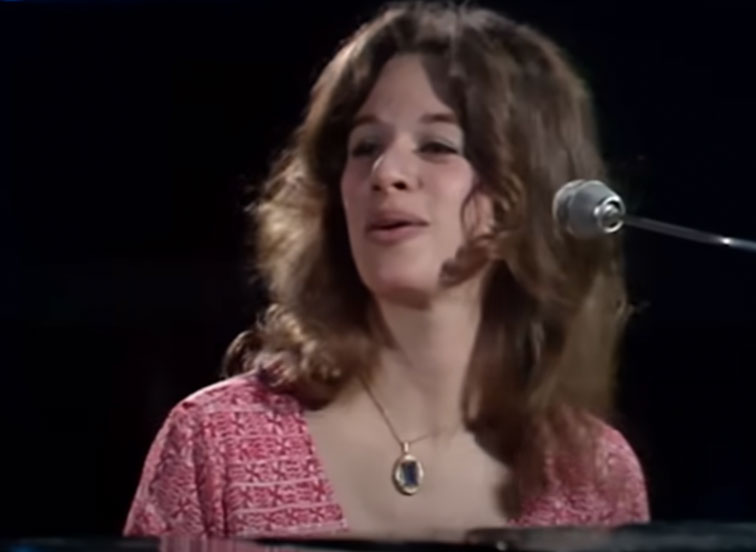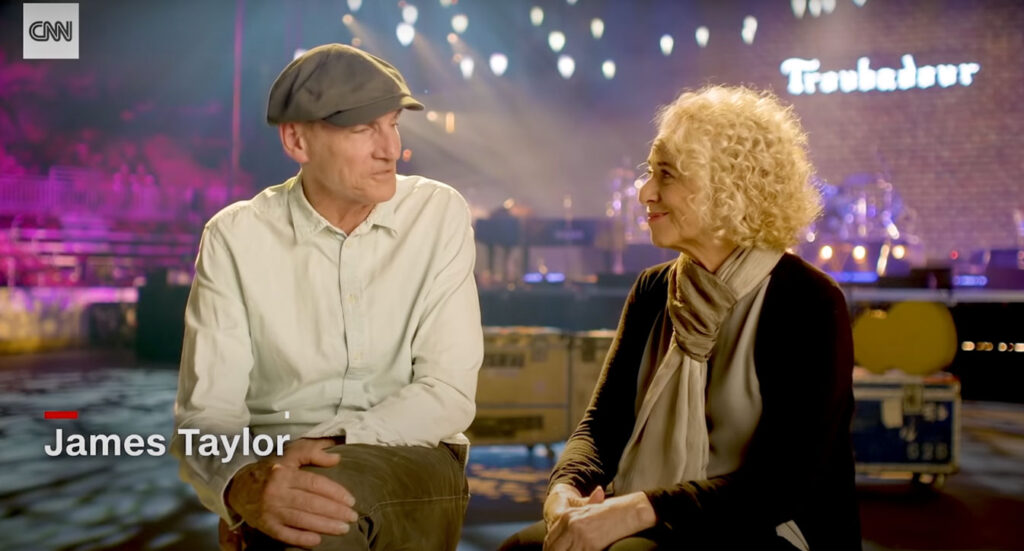By 1970, both Carole King and James Taylor needed a friend.
Each had released critically acclaimed debut albums that were commercial failures. They failed for different reasons: the recently divorced King was a reluctant live performer; Taylor’s drug addiction and hospital stays got in the way.

“You and I probably had the same musical DNA, our musical sources were probably the same”
Each had a friend in guitarist Danny Kortchmar, a childhood companion of Taylor’s who’d moved west and was playing in Los Angeles bands, including one with King on piano. By the end of 1969, Kortchmar had not only introduced the two singer-songwriters and Laurel Canyon neighbours, he was playing a key role on their second albums.
Taylor loved the song and quickly recorded a version of it. (He had not played on King’s breakout hit from Tapestry, It’s Too Late, possibly because while the music was King’s, the lyrics were by her friend Toni Stern, telling the story of Stern’s recent break up with Taylor.)



Spanning June and July 1971, It’s Too Late topped the Billboard singles chart for five weeks. After a one-week break, Taylor’s version of You’ve Got a Friend was on top - remarkably, these legendary artists’ sole chart-topping singles as performers. At the same time, Tapestry was No.1 on the Billboard albums charts with Taylor’s Mud Slide Slim and the Blue Horizon at No. 2.
More than a few threads of the first weave of the enduring tapestry of the lives of Carole King and James Taylor had been tied.
They had been recording their new albums with many of the same musicians and then sharing some of them again while each played LA’s Troubadour nightclub. “As soon as I heard it,” said Taylor of You’ve Got a Friend, “I said man, that’s just it. That’s a great, great song.” Generously, King let Taylor release his version first, which, on hearing, she said: “Oh, my god. It’s perfect.” When they have played it live together, King changes some of the piano chords to better fit in with Taylor’s arrangement, but they are otherwise almost identical. Carole Bayer Sager told King the song was too simple. Cynthia Weil, who wrote You’ve Lost That Lovin’ Feeling and We Gotta Get Out of This Place, said it was too long. Taylor said it was just too good.
A lifetime friendship had been sealed. Their musical trajectories were similarly officially entwined at the 14th Grammy Awards recognising the musical accomplishments of 1971, arguably the strongest ever year in music: It’s Too Late was Record of the Year, Tapestry was Album of the Year, and You’ve Got a Friend was Song of the Year. King won Best Pop Vocal Performance (Female) for Tapestry’s gently revealing title song, while Taylor won Best Pop Vocal Performance (Male) for You’ve Got a Friend. (The final award that night was to Quincy Jones for his version of Tapestry’s second single Smackwater Jack.)




“I think that’s the reason I gravitate towards Taylor’s music so much. His voice and guitar style are accessible and similar to mine, probably because I have been immersed in his songs since I was a kid.”
It is worth noting that King recorded Tapestry over a fortnight and during just five recording sessions each booked for three hours. Taylor was there for most, adding guitar and backing vocals. Joni Mitchell dropped in to sing on Will You Still Love Me Tomorrow joining in the session with Merry Clayton, one of Ray Charles’s Raelettes as a teenager, and these days best remembered for her “Rape, murder, it’s just a shot away” lines on the Rolling Stones’ Gimme Shelter. Merry’s husband, Curtis Amy, had made a name for himself playing that electrifying saxophone solo at the end of The Doors Touch Me chart-topper. He played those fragile flute notes during the dying moments of King’s beautiful ballad, So Far Away. He also wrote and played that unforgettable soprano sax solo on It’s Too Late. The Tapestry album may have been recorded in just 15 hours, but it spent 300 weeks on the Billboard charts, has sold 25 million copies and influences music to this day.
The Taylor-King alliance had started with King obviously the bigger of the two names. Her songs with her then husband Gerry Goffin had topped the charts for a decade: The Loco-Motion, It Might as Well Rain Until September, Up on the Roof, I'm into Something Good, One Fine Day and Pleasant Valley Sunday.
But the audience-shy genius wouldn’t tour. Unless fans had attended the low-key Troubadour shows, few people knew what she looked like. By the time she came to make Tapestry, a rising Taylor was her big-name patron. They needed each other. Until she met him, King had never written songs on her own. Hearing Taylor gave her that confidence. And together they popularised and led the singer-songwriter revolution that dominated the early 1970s with artists such as Joni Mitchell, Cat Stevens, Neil Young, Don McLean, Paul Simon and Leonard Cohen. It resonates today with the likes of Adele, Taylor Swift and Ed Sheeran.

Three years ago Taylor and King sat down to talk of their musical relationship. “You and I probably had the same musical DNA, our musical sources were probably the same,” Taylor suggested to King, adding, “but, of course, a lot of what I had been listening to was you!”
For her part, when they have toured together, King refers on stage to her and Taylor as “the essential core” of that accidental Troubadour folky singer-songwriter movement of “people who wanted to hear that kind of music and the bands that chose to play there”. They did a series of dates back there for The Troubadour’s 50th anniversary in 2007.
“Hers is a wonderful voice,” says Deborah Conway, “It’s honest. Authentic. You feel what she feels while she is singing. There’s no artifice in it.”
Conway enjoys King’s relaxed feel: “It’s not the attempt to be an incredible singer, it’s the attempt to communicate the song. It’s a different way of singing compared to what we’ve become accustomed to.”

“Hers is a wonderful voice ...It’s honest. Authentic. You feel what she feels while she is singing. There’s no artifice in it ... It’s not the attempt to be an incredible singer, it’s the attempt to communicate the song. It’s a different way of singing compared to what we’ve become accustomed to.”
Conway bought a copy on Tapestry in 1971. “I remember going down the street with a couple of dollars clutched in my hand and handing them over at the local record store,” she says. “I took it home and flogged it. Absolutely flogged it.”
Others flogged it too: it is one of the very few recordings to go 14 times platinum in the US alone.
When approached to do this show she had not heard it in a while but knew the songs, long ago hard-wired into her soul, would return easily and instantly, along with other gems studded through King’s 17 solo outings.
She is looking forward to singing all of them, but particularly the often overlooked and beautiful Tapestry title track tucked in as second last song on side two.
Conway looks back on that era fondly and considers that artists who flourished then as having written “the second part of the Great American Songbook”.

Darren Coggan has been aware of the music of James Taylor all his life and has tracked the singer’s career through the 20 solo recordings that, so far, end appropriately with American Standards – he’s written a few himself – that won Grammy for Best Traditional Pop Vocal Album.
Coggan describes Taylor’s baritone as “comforting, familiar, warm and friendly” – much like his, not that he would ever say so. But he does concede that there are similarities in the timbre of Taylor’s range.
“I think that’s the reason I gravitate towards Taylor’s music so much. His voice and guitar style are accessible and similar to mine, probably because I have been immersed in his songs since I was a kid,” Coggan says. “The artists that I love – James Taylor, Cat Stevens, John Denver, Glen Campbell – they are artists whose work I feel that I can do justice to and replicate authentically.”
But, as with Conway’s assessment of King, Coggan says that with Taylor it is much more than the voice. “He is a superb story-teller. He can paint you a picture and take you on a journey with his songs. They resonate. They make me feel something.”
Coggan says Taylor’s songs “are a good exercise for the imagination and for my soul, they are enduringly relevant”. He rates You Can Close Your Eyes, the B side of Taylor’s You’ve Got A Friend single – written for Taylor’s then girlfriend Joni Mitchell – as his favourite song of all time.
Article By
Alan Howe


